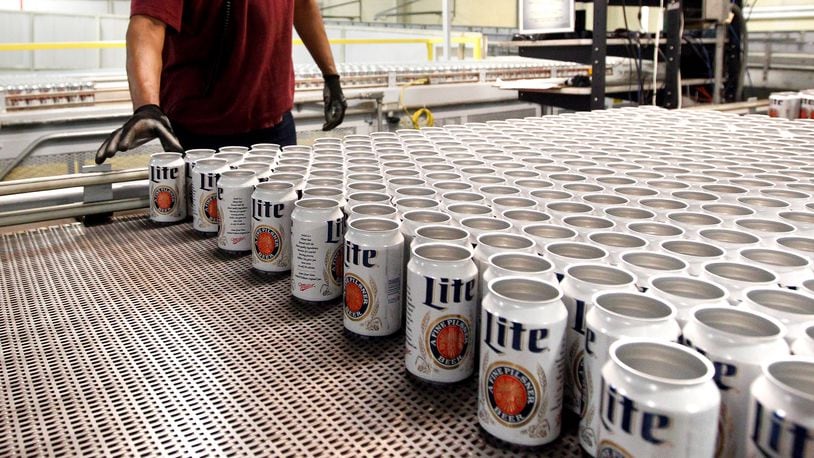(EDITOR'S NOTE: FOR MORE STORIES LIKE THIS, "LIKE" OUR NEW Dayton Business Facebook page. IT'S FREE.)
SABMiller’s U.S. operations include a MillerCoors brewery in St. Clair Twp. just outside Trenton in Butler County. MillerCoors is a joint venture of SABMiller and Molson Coors. The Trenton brewery produces more than 9 million barrels — more than 270 million gallons — of beer a year. It opened for operations in 1991, produces 63 different beer brands and employs about 550.
Anheuser-Busch operates a large Budweiser plant in Columbus with an even larger annual production — 10 million barrels a year, or more than 300 million gallons. The brewery, open since 1968, produces 20 Anheuser-Busch brands, primarily Budweiser and Bud Light.
Brock Anderson III — CEO of Dayton-based Bonbright Distributors, which delivers Miller and Coors products to bars and restaurants in much of southwest and west-central Ohio — said he believes the Trenton brewery is safe no matter the outcome of the potential buyout talks. It is one of SABMiller’s newer and larger breweries, and the announced upcoming closure of a different Miller production facility in North Carolina makes the remaining breweries more secure, Anderson said.
And based on its recent actions in similar brewery buyouts, the Justice Department will likely force a merged company to divest itself of its largest brands to keep a single company from controlling too large of a share of the market, Anderson said.
The Belgium-based AB InBev said in a statement today that its intention “is to work with SABMiller’s Board toward a recommended transaction … . There can be no certainty that this approach will result in an offer or agreement, or as to the terms of any such agreement.”
The beer industry has been undergoing a wave of consolidation as consumers with changing tastes gravitate toward craft brews and wine.
In November 2014, when the proposed AB InBev-SABMIller merger was still just a rumor, the American Antitrust Institute submitted a letter to the U.S. Department of Justice Antitrust Division saying such a merger would harm consumers and the craft-beer movement.
The combined company “would have even greater control of distribution and retail channels and could use this enhanced power to undermine the continued emergence of craft beer, which has led to greatly increased beer choice for Americans,” the institute said. The new company also “may be able to impose significant price increases on consumers,” the AAI said.
The institute urged the Justice Department to approach any such merger proposal “with exceptional skepticism.”
But buying SABMiller would strengthen AB InBev’s position in fast-growing economies in Africa and Asia. SAB Miller, formed by South African Breweries’ 2002 acquisition of U.S.-based Miller Brewing Co., employs about 69,000 people in more than 80 countries, from Australia to Zambia, Colombia and the Czech Republic.
SABMiller said it “would review and respond as appropriate to any proposal which might be made.”
Anheuser-Busch InBev now has until 5 p.m. on Oct. 14 to make an offer or walk away under U.K. rules.
AB InBev makes more than 200 beers, including Stella Artois and Beck’s. It has operations in 25 countries and sales in more than 100 of them.
• This story contains material from the Associated Press.
About the Author
